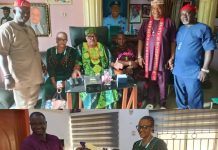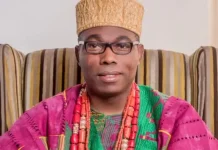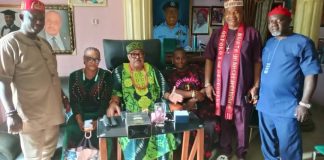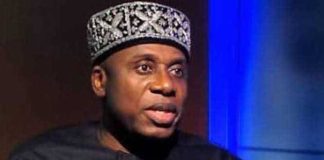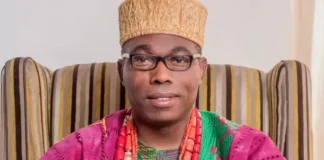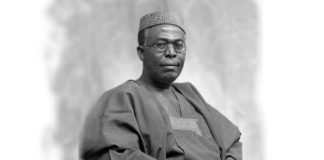🌿 Ruzu Non-Alcoholic Herbal Bitters
Ruzu Non-Alcoholic Herbal Bitters is a natural health supplement specially formulated to:
- ✅ Promote general wellness
- ✅ Detoxify the body
- ✅ Support the treatment of various ailments
Made from a powerful blend of 100% organic and medicinal herbs, Ruzu is completely alcohol-free, making it ideal for:
- 👪 All age groups
- 🌱 Health-conscious individuals
- 🌿 Anyone seeking non-alcoholic herbal remedies
Whether you're looking to boost your vitality, cleanse your system, or support healing the natural way, Ruzu Bitters offers a trusted herbal solution.
In Nigeria, where women make up nearly half of the population but are mainly ignored when making decisions, discussions regarding gender parity in governance have been reignited by a new constitutional amendment bill.
The proposed law, which is titled “A bill for an act to alter the provisions of the Constitution of the Federal Republic of Nigeria, 1999, to provide for seat reservation for women in the National and State Houses of Assembly; and for related matters,” is one of the most ambitious attempts to address the disparity in women’s political representation to date.
Twelve people, including House of Representatives Deputy Speaker Benjamin Kalu, are co-sponsoring it. The late Oriyomi Onanuga, Tolani Shagaya, Joshua Gana, Kama Nkemkanma, Mohammed Hassan, Blessing Onuh, and Chinwe Nnabuife are among them.
Francis Waive, Jafaru Leko, Jonathan Gbefwi, Khadija Ibrahim, and Amobi Godwin are additional co-sponsors.
The proposed amendments would ensure women’s participation in all legislative levels by amending important parts of the Nigerian Constitution, specifically Sections 48, 49, and 91.
The bill is an attempt to bring balance to a nation where women make up less than 5% of the legislature, according to many women in Africa’s most populous nation.
The bill’s proposed
The Federal Capital Territory (FCT) and each of Nigeria’s 36 states would each have an extra senatorial seat specifically designated for women in the 109-member Senate. By doing this, the number of senators would essentially rise to 146, with 37 more women joining the chamber.
Additionally, each state and the FCT would have an extra seat in the House of Representatives, meaning that there would be 37 more women in the new 397-member body.
To guarantee that women are represented in the governmental institutions closest to the people, state assemblies would also reserve a special seat for women from each of the three senatorial districts at the subnational level.
Women can run for other constituency seats under the current electoral system, the bill makes clear. The purpose of the reserved seats is to ensure that women have more seats in parliament.
A short-term fix
The 16-year lifespan provision of the bill is one of its most contentious features. If special seats are established, they will be effective in the upcoming national and state assemblies and will be reviewed following four cycles of general elections.
Therefore, in 16 years, lawmakers will have to decide whether to keep, extend, or do away with the policy. According to the bill’s drafters, this protection guarantees that the measure will not be viewed as a distortion of Nigerian democracy but rather as a short-term corrective measure to level the playing field for men and women.
After four cycles, it is believed that obstacles like cultural biases, political gatekeeping, and campaign expenses may have diminished, enabling women to compete more fairly without the need for special interventions.
The significance of this
Women are underrepresented in Nigeria’s legislative chambers.
Despite being nearly 50% of the population and more than 43% of registered voters, women are underrepresented in the legislative branches.
Glo Alert
Wuraola Esan, a nationalist, educator, and advocate for women’s rights, was appointed by the Western Region government under the Action Group party in 1960, making her the first female senator in Nigeria’s First Republic. After winning the seat for Bendel North during the Second Republic in 1983, Franca Afegbua became the first elected female senator. Though those pioneers cleared the path for women in politics, progress has been excruciatingly slow. In Nigeria’s legislative process, women are still largely invisible forty years later. Progress is hampered by enduring obstacles, cultural prejudice, limitations on campaign funding, and political gatekeeping.
Photograph courtesy of guardian.ng of former Senator Franca Afegbua
Senator Franca Afegbua, formerly
There were 15 women in the 469-member National Assembly at the start of the Fourth Republic (1999–2003), with three in the Senate and twelve in the House, making up roughly 3.2% of the total.
The National Institute for Legislative and Democratic Studies (NILDS) and the Inter-Parliamentary Union (IPU) have compiled data showing that representation has remained low in successive assemblies.
5th Assembly (2003–2007): roughly 27 female members
Women in the 6th Assembly (2007–2011): 34 (7.2%)
Assembly 7 (2011–2015): 26 women (5.5%).
2015–2019 8th Assembly: 23 women (5%).
Women in the 9th Assembly (2019–2023): 21 (4.5%)
10th Assembly (2023–2027): 18 women, or roughly 3.83 percent, consisting of 4 senators and 16 representatives.
The situation at the state level is not any better. Of Nigeria’s 36 state assemblies, only 48 women were elected in 2023. This represents less than 5% of the 1,019 female candidates and nearly 990 seats in the following states: Nambra, Kaduna, Bayelsa, Benue, Cross River, Delta, Ekiti, Oyo, Taraba, Nasarawa, Plateau, Kogi, Kwara, Akwa Ibom, Ogun, Lagos, Adamawa, Ondo, Enugu, and Ebonyi.
In thirteen states, women did not win seats. Kano, Katsina, Kebbi, Abia, Osun, Sokoto, Yobe, Zamfara, Borno, Gombe, Imo, Jigawa, and Bauchi did not return any women.
Significant differences are revealed by a regional breakdown. Across five states, the South-West produced the most, with 16 female lawmakers. Ekiti led with six, Lagos and Ondo followed with three each, while Ogun and Oyo produced two apiece. Osun, however, elected none.
The North-central region elected 12 female lawmakers in five of the six states. Kwara topped the list with five, Benue, Plateau, and Kogi each produced two, and Nasarawa produced one.
In the South-south, 10 women were elected across five states. Akwa Ibom led with four, Bayelsa and Delta returned two each, while Cross River and Edo produced one each.
The South-east recorded five women across three states: Ebonyi and Enugu had two each, and Anambra had one. Abia and Imo produced none.
The North-east accounted for only three women from two states. Taraba produced two, and Adamawa one, while Bauchi, Borno, Gombe, and Yobe had no female lawmakers.
Only Kaduna managed to elect two women in the North-west. The six other states—Kano, Zamfara, Jigawa, Sokoto, Katsina, and Kebbi—returned no female representatives.
These representation figures fall drastically short of the 30 per cent benchmark agreed at the 1995 Fourth World Conference on Women in Beijing, China, where nations adopted the Beijing Platform for Action as a global roadmap for gender equality.
Meanwhile, Rwanda has become a global reference point, with women holding 61 per cent of seats in its parliament. Senegal and South Africa also boast figures above 40 per cent, reflecting deliberate efforts to break structural barriers.
The new bill, if passed, would raise Nigeria’s female representation to 20 per cent at the federal level, a significant leap even if still short of the United Nations recommended 35 per cent affirmative action threshold.
The birth of “special constituency”
Perhaps the bill’s most innovative feature is the concept of “special constituencies.” These would be electoral districts carved out specifically for women.
In practical terms, this would mean each state functioning as a single women’s constituency in the House of Representatives, each senatorial district producing a woman representative at the state level, and an entirely new senatorial seat dedicated to women in the Senate.
By design, the model goes beyond tokenism or executive appointments, embedding women’s inclusion in the electoral system. It also guarantees legitimacy, since women would have to emerge through competitive elections, albeit within women-only constituencies.
A history of failed attempts
This is not the first time Nigeria has debated gender-focused constitutional amendments.
In 2022, the House of Representatives rejected five gender-related bills, one of which sought to create reserved seats for women. Others included proposals to grant citizenship to foreign-born husbands of Nigerian women and allocate 35 per cent of political appointments to women.
The rejection triggered widespread protests, with women’s groups and civil society barricading the National Assembly gates in frustration. Though the then-leadership promised to revisit the bills, they were never reconsidered before the Assembly wound up.
The new Reserved Seats Bill, however, is different in scope and strategy. With Mr Kalu as the lead sponsor and clear provisions for review, it is believed to have a stronger chance of passing. The deputy speaker chairs the House Committee on the Review of the Constitution.
The Speaker of the House of Representatives, Abbas Tajudeen, and Senate President Godswill Akpabio have also spoken in support of the bill in the past, an indication that the bill is likely to be approved by the parliament.
“I am proud to say that this House has prioritised inclusivity in our legislative agenda. I have directed the Constitutional Review Committee to focus on reforms that promote gender equity and provide additional or reserved seats for women in our legislative bodies,” Mr Tajudeen said last October, while Mr Akpabio described the bill as “an idea whose time has come.”
The inclusion of the bill in the legislative agenda of the House of Representatives also signals that the leadership views it as a priority reform.
If passed, it could mark the most transformative constitutional change for women in Nigerian politics since 1999. If rejected, it risks deepening the perception that Nigeria’s democracy remains male-dominated and structurally exclusionary.
Either way, the debate around it will force Nigeria to confront one of its most glaring contradictions: that half the population remains nearly invisible in the chambers where laws about their lives are made.
Advocates Welcome Bill
Many gender advocates across Nigeria have declared support for the bill and called on lawmakers to ensure its passage.
Ololade Ajayi, founder of the advocacy group Document Our History (DOHS Cares), described the bill as “a welcome development,” but warned that Nigeria’s entrenched political culture may frustrate its passage and implementation.
“Without deliberate interventions, it would take another 30 years for women to bridge the gap in political participation,” she told.
Osasu Ogwuche of TOS Foundation said, “This is not just a gender bill; this is a sovereignty bill. We’re not adding seats. We’re restoring balance.”



